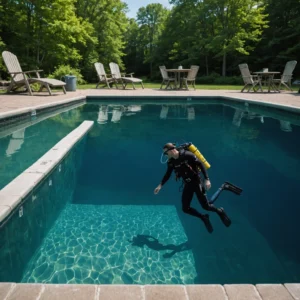Across Ocean County, many homeowners believe that hiring a professional diver is the fastest and most reliable way to find a pool leak. Divers arrive with confidence, jump in immediately, and visually inspect the pool’s interior. For many people, this looks impressive and feels credible. Unfortunately, diver-only inspections are responsible for some of the most common and costly misdiagnoses in New Jersey. In towns like Toms River, Brick, Point Pleasant, Barnegat, and Beachwood, more than half of all pool leaks originate in underground plumbing lines — a location divers cannot reach, cannot see, and cannot test accurately.
Divers rely almost entirely on visual observation, underwater listening, and the assumption that leaks occur where their eyes can see. But pools in Ocean County experience unique environmental stresses such as shifting sand, soil settlement, winter freeze cycles, and long plumbing runs that extend far past the pool walls. These conditions cause cracks and separations deep underground, not inside the pool shell. When a diver claims to “hear” a leak somewhere in the wall or “see” bubbles near a fitting, they are offering an opinion, not a scientific measurement. Without pressure testing equipment, electronic locators, and line isolation tools, divers simply cannot diagnose the true source of a leak.
A real leak detection process begins with isolating and pressure testing every plumbing line. Technicians connect gauges directly to suction lines, return lines, skimmers, and main drains. Each line is sealed and then pressurized to determine whether it holds air. If a line loses pressure, it means there is a leak somewhere underground — something a diver could never determine while swimming. This scientific test provides measurable evidence, allowing professionals to pinpoint the failing line before any digging or repairs begin.
Once a leaking line is identified, professional leak detection companies use acoustic listening devices, tracer gases, and electronic locators to find the exact source of the problem beneath soil, concrete, patios, decks, or pavers. Ocean County homes often have large backyards, long plumbing runs to equipment pads, and complex plumbing layouts that divers cannot evaluate. A diver might patch a liner, seal a visible crack, or apply underwater putty to a fitting, but these “repairs” fail repeatedly if the true leak is underground. Homeowners often find themselves calling the diver back several times, only to be told something different each visit.
This cycle leads to wasted time, money, and thousands of gallons of lost water. Towns like Toms River and Brick have high water usage rates during summer, and repeated pool refills can significantly raise monthly bills. Worse, divers frequently blame the liner, steps, or tile when they cannot identify the source of a leak. Many Ocean County homeowners have been told they need a full liner replacement — only to discover later that the problem was a cracked return line hidden three feet underground. By then, they’ve spent thousands on unnecessary repairs.
Another major risk of diver-only testing is missed safety issues. Skimmer leaks, for example, often develop in the plumbing connection behind the pool wall where the skimmer meets the suction line. Divers cannot see behind the skimmer, so they assume any visible surface imperfection is the problem. In reality, many of these leaks originate in locations entirely inaccessible to divers. Similarly, main drain leaks, return line separations, and cracked fittings behind pool walls cannot be identified underwater.
Ocean County homes also feature many older pools built decades ago with plumbing materials that deteriorate over time. PVC pipes become brittle, fittings loosen, and soil movement creates stress points. Divers are physically unable to diagnose these issues. When a diver tells a homeowner that “everything looks good inside the pool,” it gives a false sense of confidence while the real problem continues underground. This leads to weeks or even months of wasted time.
Real leak detection companies do not guess. They follow a step-by-step scientific process that isolates each part of the system. By using pressure testing, tracer gases, and advanced acoustics, they can locate even the smallest underground breaks with pinpoint accuracy. This prevents unnecessary digging and ensures that repairs are performed exactly where needed. Divers, in contrast, may direct homeowners to open the wrong section of a deck or patio, resulting in costly and completely unnecessary demolition.
The truth is simple: divers are not leak detection specialists. They are divers. Their role should be limited to assisting in very specific situations — not diagnosing entire pool systems. For Ocean County homeowners, choosing a diver-only service is one of the easiest ways to overspend on repairs and still end up with a leaking pool. Real leak detection requires training, specialized tools, and measurable testing procedures that divers simply do not have.
If your pool is losing water in Ocean County, avoid services that rely only on diving. Choose a company that performs full-system testing, identifies underground leaks, and provides hard data rather than underwater guesses. With the right approach, you can save money, stop the leak quickly, and avoid the frustration that comes with repeated misdiagnosis. Ocean County residents deserve real answers — not assumptions made at the bottom of a pool.

